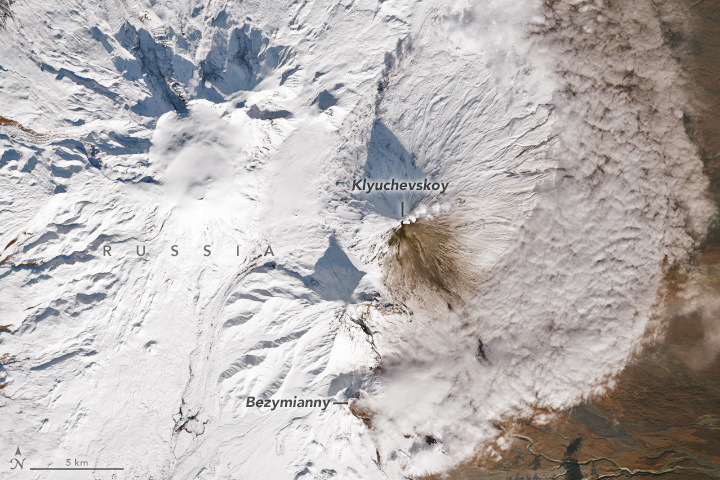
A Pair of Restless Volcanoes
Downloads
- klyuchevskoy_oli_2023289_lrg.jpg (1278x852, JPEG)
Metadata
- Sensor(s):
- Landsat 8 - OLI
- Data Date: October 16, 2023
- Visualization Date: October 20, 2023
Neighboring volcanoes on Russia’s ever-fiery Kamchatka Peninsula puffed away in mid-October 2023. The OLI (Operational Land Imager) on Landsat 8 captured this image of eruptions in action on October 16. The peaks cast shadows on the snow as the Sun traversed low in the autumn sky.
Visible at the top of the image, the stratovolcano Klyuchevskoy (also Kliuchevskoi)—Eurasia’s tallest active volcano—sent a small plume of gas, steam, and possibly some ash wafting to the northeast. The shadow of the mountain’s clear conical shape and rising plume offers a sense of three-dimensionality to the nadir (downward-looking) view.
In June 2023, the Kamchatka Volcanic Eruption Response Team (KVERT) reported the start of Strombolian eruptions at Klyuchevskoy, and in July, a new lava flow was detected on its southeast flank. Explosive eruptions continued in the ensuing months. Varying amounts of ash were sent aloft with gas and steam, at times causing the aviation color code to be elevated to orange, the third level on a four-color scale. Activity ramped up in the days before this image was acquired: increasing amounts of lava flowed down the volcano’s flanks, and incandescent materials rocketed up to 300 meters (1,000 feet) above the crater rim.
Further south, Bezymianny also spewed a volcanic plume, though it is more difficult to discern because of the cloud bank in this scene. KVERT noted an increase in activity at this volcano on October 16, when debris avalanches rushed down the slopes of the lava dome and ash was blown about 70 kilometers (45 miles) northeast of the volcano.
Located along the Pacific Ring of Fire, the Kamchatka Peninsula is a land of volcanoes, home to more than 300 of them. The frequently active Klyuchevskaya range, part of which is shown in the image above, is a common locale for geological drama visible from space. A photo taken by an astronaut on the International Space Station, for example, captured hints of recent eruptions from both Klyuchevskoy and Bezymianny.
References
- Kamchatka Volcanic Eruption Response Team (2023) Bezymianny Volcano. Accessed October 20, 2023.
- Kamchatka Volcanic Eruption Response Team (2023) Klyuchevskoy Volcano. Accessed October 20, 2023.
- NASA Earth Observatory (2014, September 25) Volcanoes of Kamchatka. Accessed October 20, 2023.
- Smithsonian Institution Global Volcanism Program (2023, October 11-17) Report on Klyuchevskoy (Russia). Accessed October 20, 2023.
- UN Environment Programme World Conservation Monitoring Centre (UNEP-WCMC) Volcanoes of Kamchatka. Accessed October 20, 2023.
NASA Earth Observatory image by Wanmei Liang, using Landsat data from the U.S. Geological Survey. Story by Lindsey Doermann.
This image record originally appeared on the Earth Observatory. Click here to view the full, original record.